

BuzzFeed comes not to bury newspapers, but to improve on them. News on the go, displayed on a mobile phone.
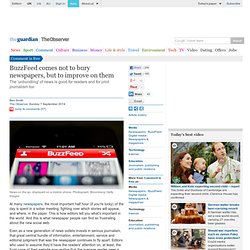
Photograph: Bloomberg/ Getty Images At many newspapers, the most important half hour (if you're lucky) of the day is spent in a sober meeting, fighting over which stories will appear, and where, in the paper. This is how editors tell you what's important in the world. And this is what newspaper people can find so frustrating about the new social web. Even as a new generation of news outlets invests in serious journalism, that great central bundle of information, entertainment, service and editorial judgment that was the newspaper continues to fly apart.
Former Guardian editor Peter Preston expressed his disquiet at this recently in these pages, even while acknowledging that BuzzFeed has invested seriously in, for instance, sending a talented reporter to cover ebola in Liberia. This inconvenience is, in fact, the "unbundling" of the package that used to be dropped on your doorstep. This is an ethical question, not a practical one. FT enters the wearable fray with a new app for Samsung. Recent studies have indicated that British readers are getting their news from fewer sources on mobile, and that the U.K. app market is reaching saturation point.
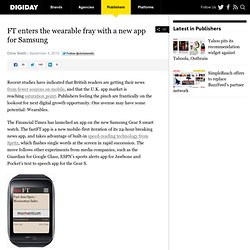
Publishers feeling the pinch are frantically on the lookout for next digital growth opportunity. One avenue may have some potential: Wearables. The Financial Times has launched an app on the new Samsung Gear S smart watch. The fastFT app is a new mobile-first iteration of its 24-hour breaking news app, and takes advantage of built-in speed-reading technology from Spritz, which flashes single words at the screen in rapid succession. The move follows other experiments from media companies, such as the Guardian for Google Glass, ESPN’s sports alerts app for Jawbone and Pocket’s text to speech app for the Gear S. Three smart things and one dumb thing the Washington Post is doing right now.
Now that the hullabaloo surrounding Jeff Bezos’ acquisition of the Washington Post has died down somewhat, and the Amazon CEO hasn’t shut down the printing presses or done anything else spectacular, attention has shifted away from the paper to other things.
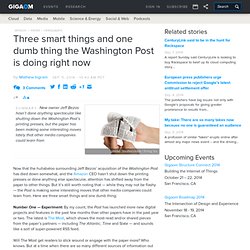
Reddit dips its toes back into mobile with Ask Me Anything app. Yet another new site for The Washington Post, this time aimed at aggregation. "Following a story is unique to us, and you can’t do that with a summary": pioneer David Cohn on Circa, copycats - and Candy Crush. David Cohn is quickly becoming one of the leading names in digital media.
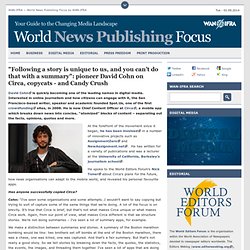
Interested in online journalism and how citizens can engage with it, the San Francisco-based writer, speaker and academic founded Spot.Us, one of the first crowdfunding sites, in 2008. He is now Chief Content Officer at Circa, a mobile app which breaks down news into concise, “atomized” blocks of content – separating out the facts, opinions, quotes and more. At the forefront of the movement since it began, he has been involved in a number of innovative projects such as AssignmentZero and NewAssignment.net. He has written for a variety of publications and was a lecturer at the University of California, Berkeley’s journalism school. He spoke to the World Editors Forum's Nick Toner about Circa’s plans for the future, how news organisations can adapt to the mobile world, and revealed his personal favourite apps. From 0 to 100,000 users in 4 months. This is Blendle, the iTunes of journalism. — On Blendle.
My Thoughts On It » Is Paper From Facebook To Be Tossed? Why Are Users Tossing Facebook’s Paper Application?
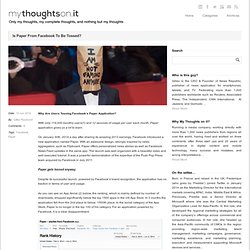
With only 119,000 monthly users(1) and 12 seconds of usage per user each month, Paper application gives us a lot to learn. On January 30th, 2014 a day after sharing its amazing 2013 earnings, Facebook introduced a new application named Paper. With an awesome design, strongly inspired by news aggregators, such as Flipboard, Paper offers personalized news stories as well as Facebook News Feed updates in the same app. The launch was well organized with a beautiful video and well executed tutorial. It was a powerful demonstration of the expertise of the Push Pop Press team acquired by Facebook in July 2011. Paper gets tossed anyway. Despite its successful launch, powered by Facebook’s brand recognition, the application has no traction in terms of user and usage. As you can see on App Annie (2) below, the ranking, which is mainly defined by number of downloads, dropped significantly below the top 1500 apps in the US App Store.
Maybe the homepage is alive after all: Quartz is trying a new twist on the traditional website front door. It was only a couple months ago that Quartz was making a bold proclamation: “The homepage is dead, and the social web has won.”
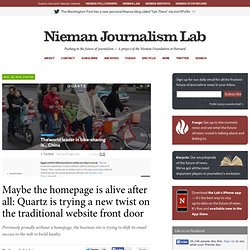
The behavior of news consumers online was shifting rapidly away from the old way — going to a news site’s homepage, looking for an article that interests you — to one fueled by the streams of links found in social media. This argument wasn’t a new one for Quartz, which launched two years ago without a traditional homepage. Type qz.com into your browser and you’d be thrown directly into the site’s top story. Rather than the usual back-and-forth of website navigation — homepage, click, back arrow, click again, back arrow — Quartz wanted you to scroll from story to story. So if you went to qz.com yesterday morning, you could be forgiven for being confused. Reddit isn’t just for arguments about duck-sized horses — it’s a resource more journalists should pay attention to.
Many journalists seem to dismiss Reddit as an internet freak-show of sorts, the kind of place that hosts discussion forums about nerdy topics like League of Legends — and even when the site does something respectable like an “Ask Me Anything” crowdsourced Q&A with President Obama, people mostly just talk about how someone asked him the infamous duck-sized horse question that has become a fixture of such interviews.
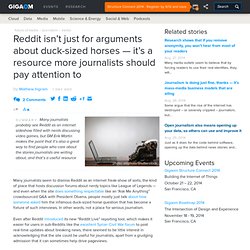
In other words, not a place for serious journalism. Even after Reddit introduced its new “Reddit Live” reporting tool, which makes it easier for users in sub-Reddits like the excellent Syrian Civil War forum to post real-time updates about breaking news, there seemed to be little interest in acknowledging that the site could be useful for journalists, apart from a grudging admission that it can sometimes help drive pageviews. Promiscuous media: News needs to go where the people are, not the other way around. A post at The Awl notes that NowThis News — a media startup funded by former Huffington Post and BuzzFeed backer Ken Lerer that has a partnership with NBC Universal — is bypassing the need for a website and inserting news updates into a number of different apps and services such as Vine, Instagram and Snapchat (something it has apparently been doing for awhile now).
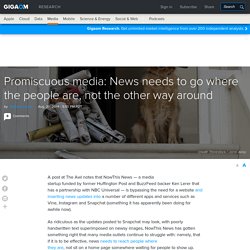
As ridiculous as the updates posted to Snapchat may look, with poorly handwritten text superimposed on newsy images, NowThis News has gotten something right that many media outlets continue to struggle with: namely, that if it is to be effective, news needs to reach people where they are, not sit on a home page somewhere waiting for people to show up. As Alyson Shontell of Business Insider noted in a post about the new BuzzFeed strategy, this is interesting because it suggests a future in which content companies may not even have websites at all.
Post and thumbnail images courtesy of Thinkstock / Janie Airey and The Awl. How FT is experimenting with aggregation service. The FT Antenna launched last week as an experiment in social media content aggregation from the Financial Times.
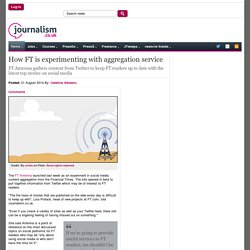
The site opened in beta to pull together information from Twitter which may be of interest to FT readers. "The fire hose of stories that are published on the web every day is difficult to keep up with", Lisa Pollack, head of new projects at FT.com, told Journalism.co.uk. "Even if you check a variety of sites as well as your Twitter feed, there still can be a lingering feeling of having missed out on something. " If we’re going to provide useful services to FT readers, we shouldn’t be too precious about exclusively pointing them to FT.comLisa Pollack, FT.com. Third party apps are winning the traffic battle. News outlets need to make tools pushing personalized content to keep readers on their sites In 2011, Bill Keller accused Arianna Huffington’s namesake site of doing no less than stealing content, arguing, “There’s often a thin line between aggregation and theft.”
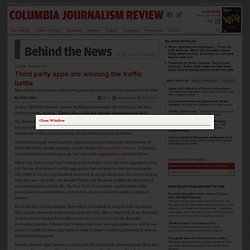
The threat from aggregation prompted lots of whining from the troubled newspaper industry around then, as aggregators were blamed for taking traffic away from mainstream outlets and repurposing content without enough attribution. This war has largely been forgotten—perhaps peace has been made with promises of better link-backs, shorter excerpts, or more closely following legal guidance. The Weird Near Future of News. "The tablet magazine has been flawed from the start" - Digiday.
Publishers: Ditch your apps; focus on mobile Web - Digiday. Publishers know they must grapple with media consumption shifting to mobile devices, but merely having a mobile focus is not enough. Consider this: While time spent on mobile devices increased by 24 percent from June 2013 to June 2014, app usage grew at a greater rate (52 percent) than mobile Web consumption (17 percent). That’s just one takeaway from a new comScore report on mobile consumption, a murky, continually shifting behavior. Below are more key statistics from the report.
Apps, not mobile Web, are driving mobile growth Mobile now makes up a majority (60 percent) of all time spent on the Web, with mobile apps themselves constituting 52 percent of all Internet consumption. Are we in a mobile app glut? Report says most US phone owners aren’t downloading apps. Did you download any apps to your smartphone this month? Chances are, you didn’t, says research firm ComScore. The company published a report showing that in the U.S., 65.5 percent of all smartphone owners aren’t adding any new apps to their phones these days. Yet more than half of smartphone owners are using apps on their phone every single day, the data suggests. This: Why Atlantic Media is funding a social platform for sharing links, one at a time. By now, you might have heard that Atlantic Media’s Andrew Golis is incubating a small social network inside the company. Golis came to Atlantic Media as entrepreneur-in-residence a little over a year ago, eventually taking over The Wire as general manager in January.
But for the last two months, he’s been working on This, a social network that only lets users share a single link a day. (For more on that name, check out Kyle Chayka’s “A History of This^, #This, and This.” Une nouvelle génération de médias fait le pari du long-format en ligne, Médias. Budget fiscalité Hollande promet des baisses d’impôt pour les classes moyennes Le chef de l’Etat annonce un nouvel allégement de l’impôt sur le revenu plus ambitieux que celui voté cet été.
La fusion de la prime pour l’emploi et... Une nouvelle génération de médias fait le pari du long-format en ligne - Les Echos. In Exposing Followers, Medium Fails Readers - ReadWrite. If Medium wants to turn itself into a respectable publisher, it probably shouldn’t behave like a social network. On Wednesday, the company announced it would make lists of followers public to Medium members. Writers and readers can see who's reading whom. Ev Williams, the cofounder of Twitter, created the site with the idea that writing can and should be social. You must log in with Twitter or Facebook to start following authors of pieces and collections of articles on the site. In Exposing Followers, Medium Fails Readers - ReadWrite. Why BuzzFeed is expanding with new Distributed division. Credit: Image from BuzzFeed.com With the announcement of a $50 million investment from venture capital firm Andreessen Horowitz, BuzzFeed outlined its expansion plans earlier this week, including a new BuzzFeed Distributed division.
Its aim will be to create original content published directly to the social web, on platforms and apps like Instagram, Vine, Tumblr and Snapchat. This isn't about directing traffic back to our websiteSummer Anne Burton, BuzzFeed. Bellingcat and The News Hub: two startups that have plans for the future of media. Two media startups of note reached important points in their life cycles last Friday. Normally, when some big deal is announced in the business world, a rah-rah press release goes out…
Inside WSJ Europe's adventures in social. For a paywalled site like WSJ Europe, social media is complicated. Sure, it needs to drive traffic, but subscriptions are always top of mind. 'News on Demand' caters to reader attention spans. News on Demand to offer articles based on readers' attention. Round-the-clock news and the rising prevalence of smartphones put increasing demands on our attention from media sources, let alone the day-to-day necessities of work, family and travel.
First Look runs headlong into journalism's two big problems. When Pierre Omidyar, the eBay billionaire, announced the creation of a news organization featuring, for starters, investigative heavyweight Glenn Greenwald, media expectations were set soaring—even here—and understandably so. Flipboard is about to get some competition on its home turf from Japan-based SmartNews. Can a billion-dollar media entity be run like a startup? BuzzFeed gets $50M to find out. News on Demand to offer articles based on readers' attention. News on Demand to offer articles based on readers' attention.
LeKiosk : le nouveau visage de la presse magazine sur tablettes. On l'aura compris, avant d'aller chercher l'interactivité, il faut d'abord régler deux problèmes : la qualité de lecture et ce fichu temps de téléchargement qui a fait s'arracher les cheveux à tous les lecteurs digitaux de la planète. Une blague récurrente aux débuts de la tablette disait qu'avant de pouvoir lire son magazine après l'avoir acheté on avait le temps d'aller boire un petit noir au café du coin, de prendre des croissants et de remonter chez soi. Sur la nouvelle appli LeKiosk, la lecture se fait en streaming, un peu comme pour un film de location, ce qui permet de commencer l'expérience tout de suite.
BuzzFeed is Developing a Mobile App for Its Serious News. Facebook : ses API médias passent la seconde. Germany is getting a data-centric nonprofit newsroom and hoping to build new models for news. Crowdfunding independent journalism. NowThis News pivots for the Vine and Instagram era. Reddit Live Is Official, Lets Anyone Create their Own Live Blog. First Look Media revises its focus, wants to be more of a journalism lab than a standalone news site. Publishers' updated mobile app strategy: curation and creation. Beacon Reader’s crowdfunding platform now lets supporters fund topics as well as journalists. Beacon Reader’s crowdfunding platform now lets supporters fund topics as well as journalists. Can Content Pay Its Way Through Social Shares And Tailored Email Newsletters? García Media → The NYT's Upshot: another friendly, useful product with news you can use.
Byliner gone bad and the business of longform journalism on the web. Read now, pay later: Is LaterPay the longed-for silver bullet? The first 30 days of the iTunes for newspapers. FOLD wants to keep you from tumbling down link rabbit holes. NewsCube: Delivering Multiple Aspects of News to Mitigate Media Bias - KSE_course_seminar_2011.pdf. How to build a successful newsletter: advice from Quartz. E-newsletters: still a ‘powerful medium’ for engagement. Crowdfunded journalism startup Contributoria adds membership options and print edition. A/B Testing for Websites Redraws the Web. Editorial Unease Rises As Content Ad Links Proliferate. Publishers want in on the content-recommendation game. Growing importance of content discovery platforms for publishers.
26 Free (or Free-to-Try) Content Curation Tools - SEW. Content discovery startup Zemanta closes $2M. Theneeds is more than 'yet another personalized news feed' Kickstarter Bets On Bringing The Slow Europe Model Of Journalism To The U.S. Brick by brick. GE wants to be where you go for news each morning. Geolocated News Is Going To Change The News Business. GE becomes legitimate online news publisher. The newsonomics of European crowds, funding new news. Three good things about Ezra Klein’s new site Vox, plus three challenges that it faces.
Former journalist launches platform to 'share and save' news. Who is winning the newsreader war on iPad? This Week in Review: Flipboard scoops up Zite, and Getty sets its photos free (kind of) Upworthy partners with ProPublica and advocacy media groups on original content. Lara Setrakian Q&A on Syria Deeply and niche journalism. The Upshot vs. Vox vs. FiveThirtyEight: A hands-on review of explanatory journalism. An intriguing ‘publishing platform for readers’ Former journalist launches platform to 'share and save' news. Flipboard is acquiring Zite from CNN, forming broad advertising and content partnership with news and media giant.
LeKiosk développe son offre et ses équipes. Creating new forms of journalism that put readers in charge. Charging for journalism – crowdfunder SA Mathieson’s experience. NYT Now app to offer tailored content throughout the day. Le 1 : c'est la taille qui compte. Read now, pay later: Is LaterPay the longed-for silver bullet? Lara Setrakian: Single-story sites like Syria Deeply have lessons to offer the rest of the news business.
Mattermap - The bigger picture. US – Newsbeat, l’application qui transforme votre journal en radio. The Newsonomics of Quartz’s — Obsessive — Explainer Business Model. Fini le journalisme de flux ! Vive le journalisme de stock. 5 lessons in start-up journalism from De Correspondent. Le site Atlantico lance une version payante. NowThis News, a leader in mobile/social/video, shifts its strategy and its personnel. 23 projets innovants sélectionnés en 2013 par le FINP. Unlocking Stories on Beacon by Beacon Blog — Beacon. Byliner, Atavist push forward with ebook subscriptions. Longform journalism startup Byliner is in trouble and says its future is unclear. [Nouvel article] LaPresse+ : un média historique qui sort de la décroissance - gabrielle.boericharles - Gmail.
Why the Oxford Mail is experimenting with WhatsApp. From Instapaper to newspaper: PaperLater wants to put your saved articles onto newsprint. Is Medium a platform or a publisher? And is Matter a magazine or a collection? Yes. Medium admits pay-per-click isn’t the best way to pay writers, still wrestling with being a platform vs. being a publisher.